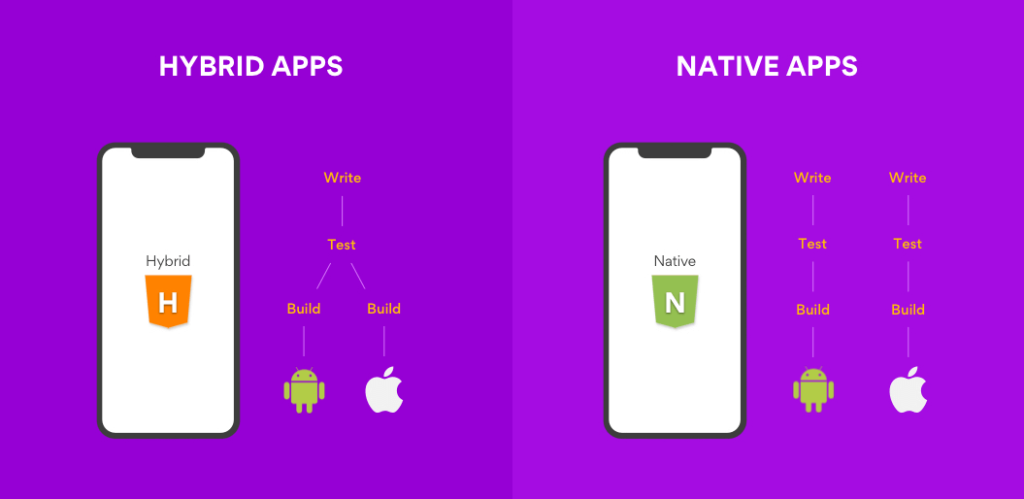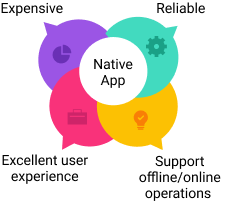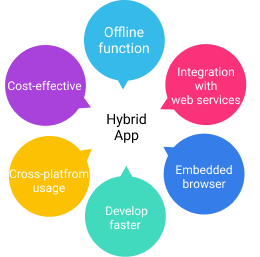
Native vs Hybrid App Development
Smart phones have revolutionized our lives in a way we could not have imagined a few decades ago. The list of benefits just keeps going on and on. From easy communication, to social networking to making presentations at work, smart phones help us in many ways.
Want to order food? Try a delivery app. Want to book a taxi? No worries, there are so many mobile apps for that. Thinking of doing the groceries? Yes, you got it. There are apps for that too. Mobile apps have made life so much easier. This is the reason why you will hardly come across a business that does not have a mobile app.
If not directly, organizations and business are incorporating them indirectly for customer engagement and satisfaction. So, it is a good idea to have a mobile app if you want more customer engagement. Even if you outsource the app development process, which most businesses do, the first question that arises is what type of app will you go for?
Honestly, there is no definitive answer of which type of app is better than the other. It depends on a number of different reasons which we will discuss after discussing what they are. The two major types are:
- Native Apps
- Hybrid Apps
What Are Native Apps?
A native app is a type of app that is developed specially to be operated on one kind of platform. As they are made for a specific platform, they are written in specific languages that are operable on the particular platform. In short, they are custom built for a type of Operating Software (OS) and don’t run on any other software.
For this, they are built on the Integrated Development Environment (IDE) of that software.
Because they are software specific, they incorporate the latest technology of that software like the image processing technology. Other apps that are for universal use across platforms can’t use very high grade and specific technology. Universally applicable apps use cloud apps which are not unique or special. The reason is simple; one feature may not be supported by particular software.
As there are two mobile OS namely Android and iOS. So, a native app for android will be one that can only operate on android phones and a native app for iOS will be one that can only be operated on Apple phones. The coding language used for both can be seen in the figure below.

Advantages of Native Apps
- As they are OS specific, you need to hire experienced developers with in depth knowledge of the programming language being used.
- Upfront, they cost much higher as compared to hybrid or web apps.
- For simple, general applications, they are not the best option to go for.
Initially, businesses worry about the high initial cost of development. But, this is not something to worry about as over time, it is going to end up being economical. The fact that they offer more personalization and customization and a better user experience, is going to help you gain profits in the long run.
Characteristics of Native Apps

What Are Hybrid Apps?
Just as the name suggests, hybrid apps are a mixture of both native and web apps. Even though they work and function like native apps, they are actually web apps that are connected after a wrapper is deployed to act as a bridge between the two. The following figure explains it better.
- Backend Code: This is where all the action takes place. It is written in languages like CSS, HTML or JavaScript.
- Native Shell: This is the shell that is downloaded on the mobile phone and is responsible for loading the code. This is done in a webpage view.
API’s (application program interfaces) give access to all the features of the mobile device to these hybrid apps. One of the biggest differences between native and hybrid apps is that the native ones are downloaded. This is why you can use them offline too. On the other hand, hybrid apps do not have this feature. You can’t use them when you are offline.
This sort of app is best when the developers are not sure whether the audience will like the app or not. Or, you want to give something useful to the people in the least possible time. Also, it works well for people with a smaller budget who can’t afford to go ahead with the native apps. Most of the present applications are hybrid apps.
These work on both platforms be it Android or iOS. So, it has wider coverage than the native apps.
Advantages of Hybrid Apps
- Having a single code base, these are operable on both iOS and Android systems.
- One code base also makes the development process simpler, quicker and easier.
- They are cost effective. As compared to native apps, they are inexpensive to develop
Disadvantages of Hybrid Apps
- These are fundamentally the same as web apps and web pages. Therefore, they require an internet connection to work. So, if you are offline, you will not be able to use them.
- Plugins are required to make use of the inbuilt features of the mobile phone you are using them on.
- There is a dilemma in case of hybrid apps. Developers need to strike a balance between the two. If they incorporate more features of iOS then the android users will not be happy. Similarly, if more features of android are included, iOS users will not be happy. So, striking a balance is critical.
Characteristics of Hybrid Apps

How to Pick the Hybrid vs. Native App Development
Now, the main question is how to choose which type of app you should go for. There is no definite answer. Both have their pros and cons and applications. Answering the following questions will help you make a decision.
- Who is your target audience?
- What is your budget?
- What is the objective of developing the application?
- Do you want the users to have a personal experience?
- How is the probable app going to be accessed?
- Do you want the app to be available offline or online?
- Are you looking for in-house development or not?
- What features are you going to include in the app?
These and so many other factors that you need to look into before deciding what type of app you should develop.
Native vs. Hybrid Apps
1. User Experience
Native apps give a much better user experience when compared to hybrid apps. They are developed keeping in mind specific operating software; therefore they are very personalized and customized. They take into account the screen size and hardware capabilities.
2. Paid or Free
Depending on whether you want to put the app out as free or paid also plays a big role in deciding which app to opt for. Hybrid apps are a good option if you plan to keep the app free and for paid apps, you can invest in making native apps.
3. Wider Access
Hybrid apps give businesses a wider access as compared to native ones. If you want to make your app accessible on more platforms to reach more people, it is possible only if you go for hybrid apps.
4. Cost of Development
As hybrid apps have one code and that is used across the different platforms, they are easier to develop. Not only that, you don’t need to optimize them for one specific platform, this means that they are cost-effective. On the contrary, native apps take a lot of time to develop. As you need to make them perfect and operational on only one software system, they need more time, effort and money.
The multiple code bases of the native apps make them expensive and complicated to make. Initially, there is a big cost difference between the two but that can easily be covered when the app goes operational and more and more users download it.
Conclusion
Hybrid and native apps both have their advantages and disadvantages. They come with their own set of characteristics that make them a good choice. Choosing which type of app is better totally depends on the requirements and demands of the business. Mostly, businesses outsource the app development process. In this case, it is important to tell the app developing agency what you have in mind so that there is no ambiguity.
Share this post:

Web Development Agency
In the times of today, it is nearly impossible to even imagine that a company or business can survive and compete without an online presence in the market.

How to Become a Successful Full Stack Developer
The development of a software application can be broken down into 2 parts. The two areas of expertise are known as front-end and back-end development.

How To Setup A WordPress Development Environment?
Are you working on WordPress development frequently? 5 Steps to Setup a WordPress Development Environment

Top 10 Plugins to Help with WordPress Security
Security is one of the main concerns of any platform these days. As information is getting more and more digital, data is becoming more precious than anything.

7 Stages of Mobile App Development Process 2021 Explained
Latest News Do you want to jump on the bandwagon of the mobile app world? Mobile apps are here to stay! You can get to

How is GDPR affecting business and which businesses does it currently affect?
The internet has revolutionized the way we do business. But at the same time, the internet itself is in a constant process of innovation and evolution.
Connect with us to find out what true value added services are.
contact@sourceone.io
Headquarters – Ho Chi Minh city, Vietnam
(+84) 353 197 427
Brand – Sydney, Australia
(+61) 401 713 724
About SourceOne
Privacy
Terms of Use
Mobile application
Website and API Services
UI/UX Design
Next – Gen Technology
NEWSLETTER
Join us for get latest updates




